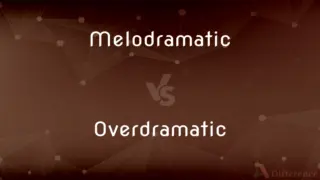Spectacles vs. Goggles — What's the Difference?
By Tayyaba Rehman — Updated on November 3, 2023
Spectacles are glasses with frames holding prescription lenses for vision correction, while goggles are protective eyewear that encloses the area around the eyes to prevent particulates, water, or chemicals from striking the eyes.

Difference Between Spectacles and Goggles
Table of Contents
ADVERTISEMENT
Key Differences
Spectacles are traditionally a form of eyewear consisting of a frame that holds two pieces of glass or plastic, which have been ground into lenses to correct refractive errors in a person's vision. They are primarily designed for vision correction or for aesthetic purposes as a fashion accessory. On the other hand, goggles are a type of protective eyewear that fit tightly around the area surrounding the eyes, offering protection against dust, water, chemicals, and other potential hazards. They are designed to provide a seal to protect the eyes, not necessarily to correct vision.
Spectacles, also known as glasses, are typically worn for extended periods and are an integral part of the daily lives of individuals who require vision correction. They may also include features such as anti-glare coatings, bifocal lenses, or photochromic lenses that darken in response to sunlight. Goggles, however, are often used temporarily and specifically during activities where the eyes need to be protected from environmental hazards such as in laboratories, construction sites, or during sports.
While spectacles can be a fashionable choice and come in a variety of styles, sizes, and colors, goggles are less about fashion and more about function. Spectacles are chosen to complement one's facial features and personal style, while goggles are selected based on the type of protection required for a particular task or environment.
One commonality between spectacles and goggles is that they can both incorporate prescription lenses. Prescription goggles are available for those who require corrective lenses in situations where protection is also needed, while spectacles routinely have lenses tailored to the wearer's prescription.
Both spectacles and goggles serve important roles for vision; spectacles mainly correct visual impairments, while goggles protect the eyes from hazardous materials or conditions. The choice between the two depends on the needs of the user—whether it's daily vision correction or temporary eye protection during specific activities.
ADVERTISEMENT
Comparison Chart
Primary Function
Vision correction or fashion accessory.
Eye protection from environmental hazards.
Fit and Coverage
Rest on the bridge of the nose with minimal facial enclosure.
Enclose and seal around the eyes for maximum protection.
Prescription Lenses
Commonly used with prescription lenses.
Can be fitted with prescription lenses but not as common.
Usage Duration
Worn daily, often for long periods.
Worn temporarily, during specific activities for protection.
Style and Aesthetics
Wide range of styles for aesthetic appeal.
Functional design, less emphasis on aesthetics.
Seal
No seal around the eyes.
Tight seal to prevent entry of harmful materials.
Varieties
Includes reading glasses, bifocals, etc.
Includes safety goggles, swimming goggles, etc.
Use Environment
Indoors, outdoors, wherever vision correction is needed.
Work sites, laboratories, sports, where hazards are present.
Accessories
Can have accessories like chains, cleaning cloths, etc.
Often come with features like anti-fog, ventilation, straps.
Compare with Definitions
Spectacles
A device to aid vision with lenses set in a frame that sits on the nose.
He adjusted his spectacles before examining the document closely.
Goggles
A form of eye protection that fits snugly, encasing the eye area.
To protect against chlorine, swimmers wear goggles in the pool.
Spectacles
Eyewear consisting of lenses in a frame for vision correction.
She picked up her spectacles to read the fine print.
Goggles
Eyewear providing a protective barrier against environmental hazards.
In the midst of the sandstorm, her goggles kept her vision clear.
Spectacles
A fashion statement in the form of eyeglasses.
Her red spectacles matched her vibrant outfit perfectly.
Goggles
Protective eyewear sealing the eyes from external factors.
He donned his goggles before starting to weld the metal pieces.
Spectacles
Glasses that correct refractive errors, improving the wearer's vision.
Without her spectacles, the world appeared blurred and indistinct.
Goggles
A device to shield eyes from elements like water, dust, or chemicals.
The scientist put on her goggles before pouring the reactive solution.
Spectacles
An aid for the eyes, typically for those with vision impairments.
Grandpa's spectacles were an essential part of his daily life.
Goggles
Sealed glasses often used in sports and industrial settings.
The skier secured his goggles before heading down the snowy slope.
Spectacles
Something that can be seen or viewed, especially something of a remarkable or impressive nature.
Goggles
Goggles, or safety glasses, are forms of protective eyewear that usually enclose or protect the area surrounding the eye in order to prevent particulates, water or chemicals from striking the eyes. They are used in chemistry laboratories and in woodworking.
Spectacles
A public performance or display, especially one on a large or lavish scale.
Goggles
To stare with wide and bulging eyes.
Spectacles
A regrettable public display, as of bad behavior
Drank too much and made a spectacle of himself.
Goggles
To roll or bulge. Used of the eyes.
Spectacles
A pair of eyeglasses.
Goggles
To roll or bulge (the eyes).
Spectacles
Something resembling eyeglasses in shape or suggesting them in function.
Goggles
A stare or leer.
Spectacles
Plural of spectacle
Goggles
GogglesA pair of tight-fitting eyeglasses, often tinted or having side shields, worn to protect the eyes from hazards such as wind, glare, water, or flying debris.
Spectacles
A pair of lenses set in a frame worn on the nose and ears in order to correct deficiencies in eyesight or to ornament the face.
Goggles
Protective eyewear set in a flexible frame to fit snugly against the face.
Goggles must be worn in the swimming pool.
We had to put on our goggles as it was snowing outside.
Spectacles
(cricket) pair
Goggles
Blinds for shying horses.
Spectacles
Optical instrument consisting of a pair of lenses for correcting defective vision
Goggles
Spectacles worn to protect the eyes
Common Curiosities
What are spectacles used for?
Spectacles are used primarily for vision correction or as a fashion accessory.
Are spectacles and goggles the same?
No, spectacles are for vision correction or fashion, while goggles provide eye protection.
Can I wear goggles over my spectacles?
Some goggles are designed to fit over spectacles, but it's better to use prescription goggles for a proper fit.
Do goggles provide UV protection?
Many goggles provide UV protection, particularly those designed for outdoor sports.
Can goggles have prescription lenses?
Yes, goggles can be fitted with prescription lenses for those who need vision correction during activities.
How do spectacles differ from goggles in terms of design?
Spectacles have a lightweight frame and lenses, whereas goggles have a protective seal around the eye area.
How should spectacles fit on my face?
Spectacles should rest comfortably on the bridge of your nose without pinching or sliding.
Can I wear spectacles for eye protection in a lab?
Spectacles are not a substitute for protective goggles in hazardous environments like labs.
Do goggles come in different sizes?
Yes, goggles are available in various sizes to ensure a proper, protective fit.
Are there goggles designed for specific sports?
Yes, there are sports-specific goggles designed for activities like swimming, skiing, and racquetball.
Can I get bifocal lenses in spectacles?
Yes, bifocal lenses are available in spectacles for those who need different lens strengths for near and far vision.
Are there spectacles that can transition to sunglasses?
Yes, there are photochromic spectacles that darken when exposed to sunlight.
Are there anti-fog solutions for goggles?
Yes, anti-fog sprays and wipes are available to prevent fogging in goggles.
Do I need special goggles for swimming in the ocean?
Yes, it’s recommended to use saltwater-resistant swimming goggles for the ocean.
How often should I replace my spectacles or goggles?
Replace your spectacles as your prescription changes or if damaged, and replace goggles if the seal or clarity is compromised.
Share Your Discovery

Previous Comparison
Wasp vs. Bee
Next Comparison
Melodramatic vs. OverdramaticAuthor Spotlight
Written by
Tayyaba RehmanTayyaba Rehman is a distinguished writer, currently serving as a primary contributor to askdifference.com. As a researcher in semantics and etymology, Tayyaba's passion for the complexity of languages and their distinctions has found a perfect home on the platform. Tayyaba delves into the intricacies of language, distinguishing between commonly confused words and phrases, thereby providing clarity for readers worldwide.












































